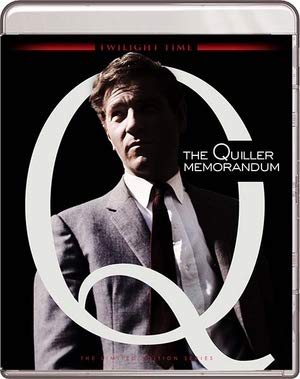
With the success of the first James Bond film, Dr. No, in 1962 there was a mad rush of spy films trying to cash in on the Bond phenomenon. Many of these films were quite clearly ripping off the Bond series with similar plots, similar aesthetics, and spies called Charles, Bind, James Tont, and the like. It got so bad in Italy that United Artists threatened legal action over the use of the 007 designations (which only caused them to switch it to similar numbers like 077). This, in turn, created the anti-Bond sub-genre of films that threw out all the nonsense Bond tropes like crazy gadgets, and increasingly ridiculous stunt-filled action sequences, opting instead for a more realistic approach to the spy genre.
Made in 1966, The Quiller Memorandum goes for this approach. There are no gadgets, no attractive women with double entendre names, no over-complicated plots to take over the world, nor big action scenes (hardly any action scenes at all and the big showdown at the end happens off screen.). The heavy lifting belongs to the dialogue and the actors who speak it. This is all meant to be intelligent, collected, and the exact opposite of the Bond movies. It is designed to be more John le Carré than Ian Flemming. It fails on both accounts.
The story involves a suave British Agent being sent to Berlin to infiltrate a secret neo-Nazi group after they have murdered two other agents. It has a great cast including George Segal as Quiller the agent, Alec Guinness as his controller, Max von Sydow as the head Nazi, and George Sanders as the big boss.
On paper, The Quiller Memorandum ought to be a knockout. I’m a sucker for intelligent spy films where agents use their wits and not their fists, and that cast should be able to make the phone book exciting. But the reality of the situation, as it so often chooses to be, is much different than those scratchings on paper. My goodness, this movie is dull.
It isn’t that nothing happens for there is quite a bit going on from car chases to lovemaking to being captured by the Nazis to escaping the Nazis to being capture by Nazis again. Ther’s even a car bomb. It isn’t one of those spy stories where the goings-on is so complicated you get lost in its labyrinths. My quick rundown of the plot above is pretty much all there is. Rather, it is how these things happen, how the story is told, which never finds its way to anything resembling interesting not to mention exciting.
The scenes with Max von Sydow come closest. He brings a great menace to the role of Oktober, the mysterious leader of Phoenix, the Neo-Nazi group. I believed he was capable of real horror as he is interrogating Quiller. Trouble is, I was never sure exactly what he wanted. He asks Quiller where the base is (presumably meaning the home of operations for the British Secret Service in Berlin) but for what purpose I am unclear. Are they going to blow it up? What good would destroying a British office in West Germany do for a Nazi? Speaking of which, they are called Nazis by the British but never by Oktober or any of his gang. They aren’t skinheads and they don’t espouse any racist views, or any views of any kind, really. They are Neo-Nazis so that makes them the bad guys but what they plan to do is never made clear. They have no motivations or any real character outside of being Nazis.
George Segal is completely miscast. The tone of the film is somber and serious and he spends most of the movie making wisecracks. These aren’t the cynical witticism of Sam Spade or Phillip Marlowe either, he’s straight-up making jokes like an easy-going clown, which makes absolutely no sense when placed into this dark thriller. It’s like he thought he was in a different movie altogether. Alec Guinness doesn’t fare much better as he practically sleepwalks through his scenes. George Sanders isn’t in it enough to make an impression. He’s playing the sort of boss who is more concerned with his meal and dinner parties with the prime minister than the life and death situations he’s in charge of.
If you are going for an anti-Bond approach with your spy movie, then the characters need to be interesting, or your stakes need to be high, or your villains need to extraordinarily memorable, or your plotting needs to do something to make your movie worth watching. The Quiller Memorandum does none of these things. The only real thing it did for me was bore me to tears.
Twilight Time brings The Quiller Memorandum to Blu-ray with a 1080p transfer at an aspect ratio of 2.35:1. Bonus features include an isolated score track, an audio commentary by film historians Eddy Friedfeld and Lee Pfeiffer plus the theatrical trailer and a short essay in the pull-out booklet.
The mad rush of spy movies in the wake of the James Bond phenomenon produced all sorts of films ranging from the good to the bad to the weird and everything in between. Despite its stacked cast, The Quiller Memorandum sadly falls into the “completely forgettable” category.